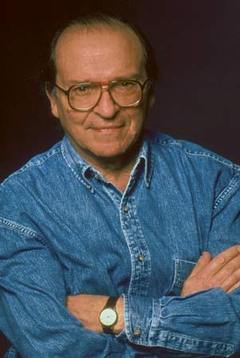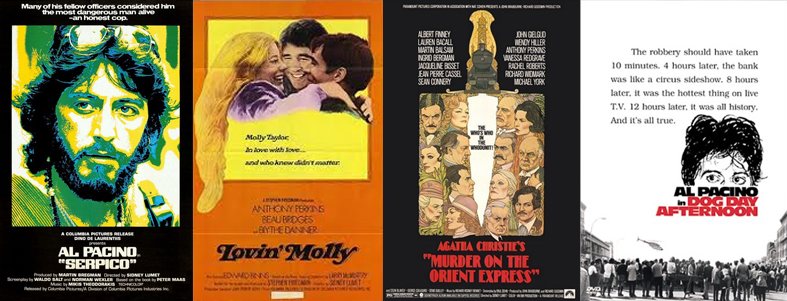Saturday April 09, 2011
Sidney Lumet (1924-2011)
Sidney Lumet's “Making Movies” was the first insider look at the movies that I read that stuck. I recommended it to friends for years. I bought it for I don't know how many of them. Now I can't find my copy. I must‘ve loaned it out.
 Lumet always seemed like a gentleman to me, and gracious toward other talents, and my haphazard reading today has only reinforced that notion. Here he is on Christopher Reeve, whom he directed in “Death Trap”:
Lumet always seemed like a gentleman to me, and gracious toward other talents, and my haphazard reading today has only reinforced that notion. Here he is on Christopher Reeve, whom he directed in “Death Trap”:
What seemed such a nice, simple, artless performance in “Superman” was the finest kind of acting. Reeve’s timing — and humor — has to be just about perfect to make the character come off.
Here he is on Tab Hunter, whom he directed in “That Kind of Woman” with Sophia Loren:
Primarily a character actor, yet always used as a leading man because he's so pretty. I‘ve seen him do character parts in which he’s really great. But, as a leading man, he tightens up. Mostly, he turned to character work in American television when his Hollywood career started going sour. Then, he played the roles of psychotic killers and so forth, and his talent became clear.
I wonder if this comment on Akira Kurosawa was related to some Q&A, some interview with a journalist, regarding Lumet's 1959 TV movie based on Kurosowa's “Rashomon”:
Kurosawa never affected me directly in terms of my own movie-making because I never would have presumed that I was capable of that perception and that vision.
I know. They made a TV movie based on “Rashomon”? With Ricardo Montalban? Yep, and directed by Sidney Lumet.
He was one of the better directors to come out of 1950s TV. Before he was 30 he'd directed the Gettysburg Address, the Conquest of Mexico and the Assassination of Jesse James by the Coward Robert Ford, with John Kerr as his Jesse and James Dean as his Robert Ford, all for the “You Are There” TV show.
His first theatrical movie, “12 Angry Men,” was more like a play. It didn't move so Lumet made it move. Did he think it was his greatest movie? Do we? The voters at IMDb.com certainly do. It's considered the seventh greatest movie of all time by their rankings, ahead of “Seven Samurai,” “Casablanca,” “The Third Man,” “Rear Window,” almost everything. I wouldn't rank it so high, but ... Not bad for a first film. Lumet began there and ended with “Before the Devil Knows You‘re Dead,” which contains my favorite performance by Ethan Hawke. Forty-one films between those two. Nice bookends to a career.
His heyday was the 1970s. In a span of three years he directed “Serpico,” “Murder on the Orient Express,” “Dog Day Afternoon,” and “Network.” Wow. He was always interested in cops and lawyers and grit and ethics and “How do you do the right thing when everyone around you is getting ahead doing the wrong thing?” He loved New York. He kept filming on location. Is that why he never won an Oscar? Not enough time in Hollywood? Or did he never deserve to win one? He was nominated four times but can you make an argument for “12 Angry Men” over David Lean’s “The Bridge on the River Kwai,” or “Dog Day Afternoon” over Milos Foreman's “One Flew Over the Cuckoo's Nest”?
“‘Network’!” fans will say. “He should‘ve trounced John Avildsen’s ‘Rocky’!” True. Although that was also the year Martin Scorsese wasn't even nominated for “Taxi Driver.” There's overlooked and there's overlooked.
In the late ‘70s he kept adapting Broadway (“Equus,” “The Wiz,” “Death Trap”) to not much avail. He merely made an OK film out of one of my favorite books, E.L. Doctorow’s “The Book of Daniel.” He remained serious in a business that increasingly wasn‘t. He made movies for adults, dramas, in an industry that geared its product for the younger and dumber crowd. Soon, well, he was kind of out of the picture.
One of the friends I gave that “Making Movies” book to was my brother-in-law, Eric Muschler, Jordy’s dad, who wrote the following to me in an e-mail in 1999:
I loved reading the behind-the-scenes set-up stuff. The planning of each frame, the scheduling. Amazing. And the progression of light and camera angles and how even that is used to move the theme and story. (I.e. 12 Angry Men moving from downward shots to upward shots to grow the sense of being trapped in the room.)
Here's the Times' obit.
Here's Nathaniel's farewell at FilmExperience.net, which includes every one of Lumet's 43 movie posters. (Nathaniel, thanks for line 6, below.)
Rest in peace, Mr. Lumet, you craftsman, you serious man.

Baseball's Active Leaders, 2023
What Trump Said When About COVID
Recent Reviews
Everything Everywhere All at Once (2022)
Black Panther: Wakanda Forever (2022)
Doctor Strange in the Multiverse of Madness (2022)
Spider-Man: No Way Home (2021)
The Cagneys
A Midsummer Night's Dream (1935)
Something to Sing About (1937)
Angels with Dirty Faces (1938)
A Lion Is In the Streets (1953)
Man of a Thousand Faces (1957)
Never Steal Anything Small (1959)
Shake Hands With the Devil (1959)







